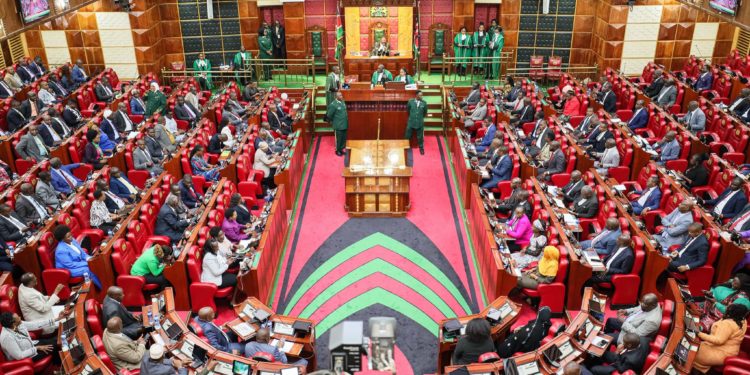The government is grappling with a KES 300 billion financing gap for the upcoming fiscal year, following the unexpected rejection of the Finance Bill 2024.
National Assembly Speaker Moses Wetangula has on Thursday outlined the implications of this development, signaling potential spending cuts and a supplementary budget to address the shortfall.
In a detailed explainer issued on June 27, 2024, Speaker Wetangula revealed the far-reaching consequences of President William Ruto’s memorandum recommending the deletion of all 69 clauses in the Finance Bill 2024. This move, described as a “rejection of the bill in its entirety,” has left lawmakers scrambling to address the budgetary implications with just days remaining before the new fiscal year begins on July 1.
“We are guided that the rejection and loss of the entire Finance Bill, 2024 shall occasion a financing gap of approximately KES 300 billion between the expenditure approved by the National Assembly through the Appropriation Bill, 2024 and the projected revenues that may be raised from the existing tax measures,” Wetangula stated.
The Speaker explained that while the Appropriation Bill 2024, which authorizes the withdrawal of funds from the Consolidated Fund, has already been passed, the rejection of the Finance Bill leaves a significant revenue shortfall.
To bridge this gap, Wetangula suggested that “the financing gap may be bridged by the reduction of approved expenditure. This may be achieved by enacting a Supplementary Appropriation Bill in accordance with the applicable procedure.”
This highlights the delicate balance between revenue generation and public sentiment in Kenya. According to Wetangula, the President’s decision to reject the bill was “informed by the need to reflect the voice of the people of Kenya who have rejected the Bill in its entirety.”
While unusual, this is not unprecedented in Kenyan politics. Wetangula cited two previous instances during the 11th and 12th Parliaments where presidents referred bills back with recommendations to delete all clauses. In both cases, the National Assembly failed to muster the two-thirds majority required to override the presidential veto.
The rejection of the Finance Bill does not mean it can become law through the passage of time. Wetangula emphasized, “Having been referred back to the National Assembly for reconsideration on account of the President’s reservations, the Finance Bill, 2024 cannot become law through mere lapse of time.”
As the country approaches the start of the new fiscal year, all eyes will be on the Departmental Committee on Finance and National Planning, which is expected to report to the House when it resumes regular sittings on July 23, 2024. The committee’s recommendations and the subsequent actions of the National Assembly will be crucial in determining how Kenya navigates this unexpected fiscal challenge.


















